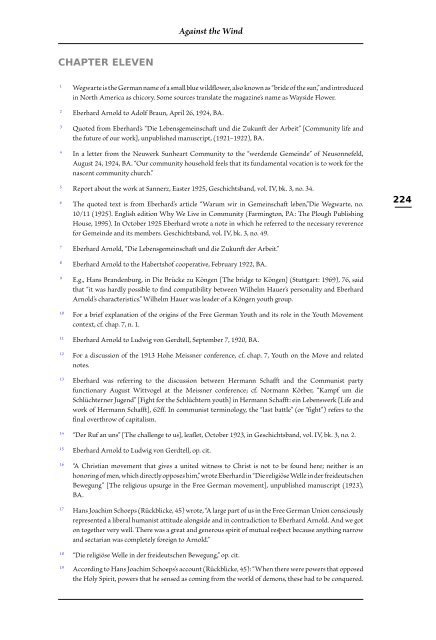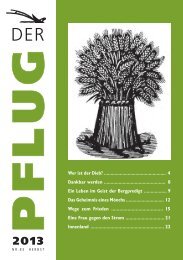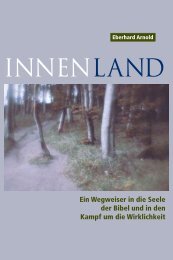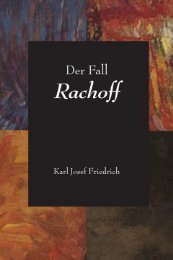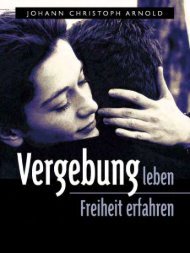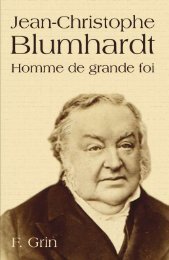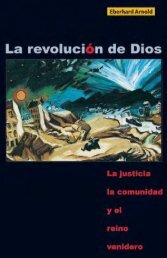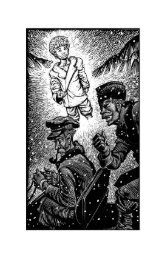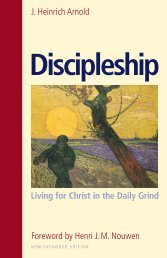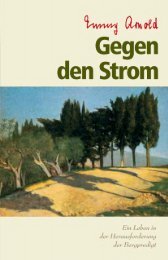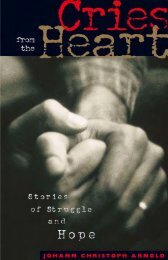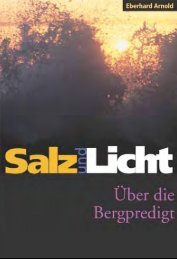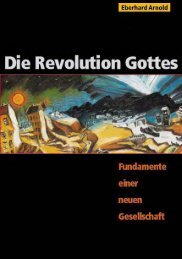Against the Wind: Eberhard Arnold and the Bruderhof - Plough
Against the Wind: Eberhard Arnold and the Bruderhof - Plough
Against the Wind: Eberhard Arnold and the Bruderhof - Plough
Create successful ePaper yourself
Turn your PDF publications into a flip-book with our unique Google optimized e-Paper software.
ChaptEr ElEvEn<br />
<strong>Against</strong> <strong>the</strong> <strong>Wind</strong><br />
1 Wegwarte is <strong>the</strong> German name of a small blue wildflower, also known as “bride of <strong>the</strong> sun,” <strong>and</strong> introduced<br />
in North America as chicory. Some sources translate <strong>the</strong> magazine’s name as Wayside Flower.<br />
2 <strong>Eberhard</strong> <strong>Arnold</strong> to Adolf Braun, April 26, 1924, BA.<br />
3 Quoted from <strong>Eberhard</strong>’s “Die Lebensgemeinschaft und die Zukunft der Arbeit” [Community life <strong>and</strong><br />
<strong>the</strong> future of our work], unpublished manuscript, (1921–1922), BA.<br />
4 In a letter from <strong>the</strong> Neuwerk Sunheart Community to <strong>the</strong> “werdende Gemeinde” of Neusonnefeld,<br />
August 24, 1924, BA. “Our community household feels that its fundamental vocation is to work for <strong>the</strong><br />
nascent community church.”<br />
5 Report about <strong>the</strong> work at Sannerz, Easter 1925, Geschichtsb<strong>and</strong>, vol. IV, bk. 3, no. 34.<br />
6 The quoted text is from <strong>Eberhard</strong>’s article “Warum wir in Gemeinschaft leben,”Die Wegwarte, no.<br />
10/11 (1925). English edition Why We Live in Community (Farmington, PA: The <strong>Plough</strong> Publishing<br />
House, 1995). In October 1925 <strong>Eberhard</strong> wrote a note in which he referred to <strong>the</strong> necessary reverence<br />
for Gemeinde <strong>and</strong> its members. Geschichtsb<strong>and</strong>, vol. IV, bk. 3, no. 49.<br />
7 <strong>Eberhard</strong> <strong>Arnold</strong>, “Die Lebensgemeinschaft und die Zukunft der Arbeit.”<br />
8 <strong>Eberhard</strong> <strong>Arnold</strong> to <strong>the</strong> Habertshof cooperative, February 1922, BA.<br />
9 E.g., Hans Br<strong>and</strong>enburg, in Die Brücke zu Köngen [The bridge to Köngen] (Stuttgart: 1969), 76, said<br />
that “it was hardly possible to find compatibility between Wilhelm Hauer’s personality <strong>and</strong> <strong>Eberhard</strong><br />
<strong>Arnold</strong>’s characeristics.” Wilhelm Hauer was leader of a Köngen youth group.<br />
10 For a brief explanation of <strong>the</strong> origins of <strong>the</strong> Free German Youth <strong>and</strong> its role in <strong>the</strong> Youth Movement<br />
context, cf. chap. 7, n. 1.<br />
11 <strong>Eberhard</strong> <strong>Arnold</strong> to Ludwig von Gerdtell, September 7, 1920, BA.<br />
12 For a discussion of <strong>the</strong> 1913 Hohe Meissner conference, cf. chap. 7, Youth on <strong>the</strong> Move <strong>and</strong> related<br />
notes.<br />
13 <strong>Eberhard</strong> was referring to <strong>the</strong> discussion between Hermann Schafft <strong>and</strong> <strong>the</strong> Communist party<br />
functionary August Wittvogel at <strong>the</strong> Meissner conference; cf. Normann Körber, “Kampf um die<br />
Schlüchterner Jugend” [Fight for <strong>the</strong> Schlüchtern youth] in Hermann Schafft: ein Lebenswerk [Life <strong>and</strong><br />
work of Hermann Schafft], 62ff. In communist terminology, <strong>the</strong> “last battle” (or “fight”) refers to <strong>the</strong><br />
final overthrow of capitalism.<br />
14 “Der Ruf an uns” [The challenge to us], leaflet, October 1923, in Geschichtsb<strong>and</strong>, vol. IV, bk. 3, no. 2.<br />
15 <strong>Eberhard</strong> <strong>Arnold</strong> to Ludwig von Gerdtell, op. cit.<br />
16 “A Christian movement that gives a united witness to Christ is not to be found here; nei<strong>the</strong>r is an<br />
honoring of men, which directly opposes him,”wrote <strong>Eberhard</strong> in “Die religiöse Welle in der freideutschen<br />
Bewegung” [The religious upsurge in <strong>the</strong> Free German movement], unpublished manuscript (1923),<br />
BA.<br />
17 Hans Joachim Schoeps (Rückblicke, 45) wrote, “A large part of us in <strong>the</strong> Free German Union consciously<br />
represented a liberal humanist attitude alongside <strong>and</strong> in contradiction to <strong>Eberhard</strong> <strong>Arnold</strong>. And we got<br />
on toge<strong>the</strong>r very well. There was a great <strong>and</strong> generous spirit of mutual resect because anything narrow<br />
<strong>and</strong> sectarian was completely foreign to <strong>Arnold</strong>.”<br />
18 “Die religiöse Welle in der freideutschen Bewegung,” op. cit.<br />
19 According to Hans Joachim Schoeps’s account (Rückblicke, 45): “When <strong>the</strong>re were powers that opposed<br />
<strong>the</strong> Holy Spirit, powers that he sensed as coming from <strong>the</strong> world of demons, <strong>the</strong>se had to be conquered.<br />
224


